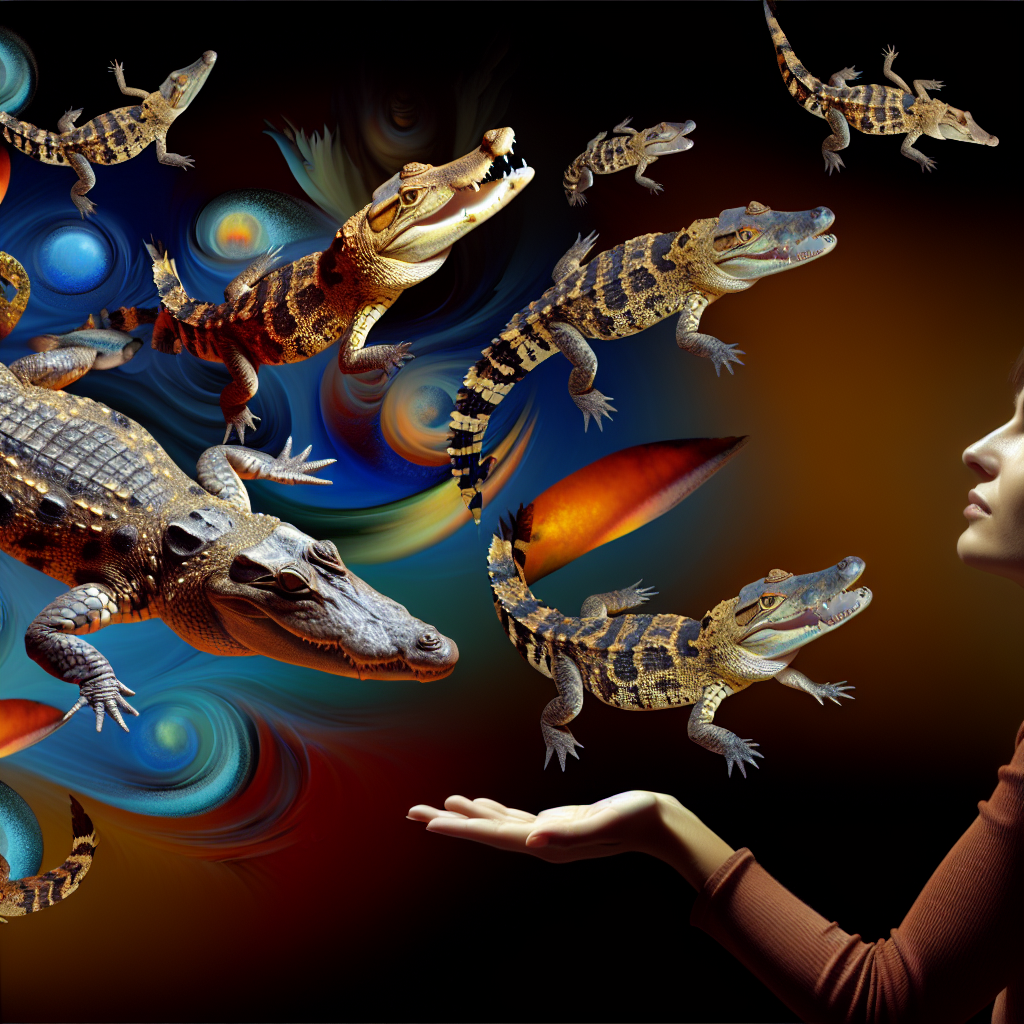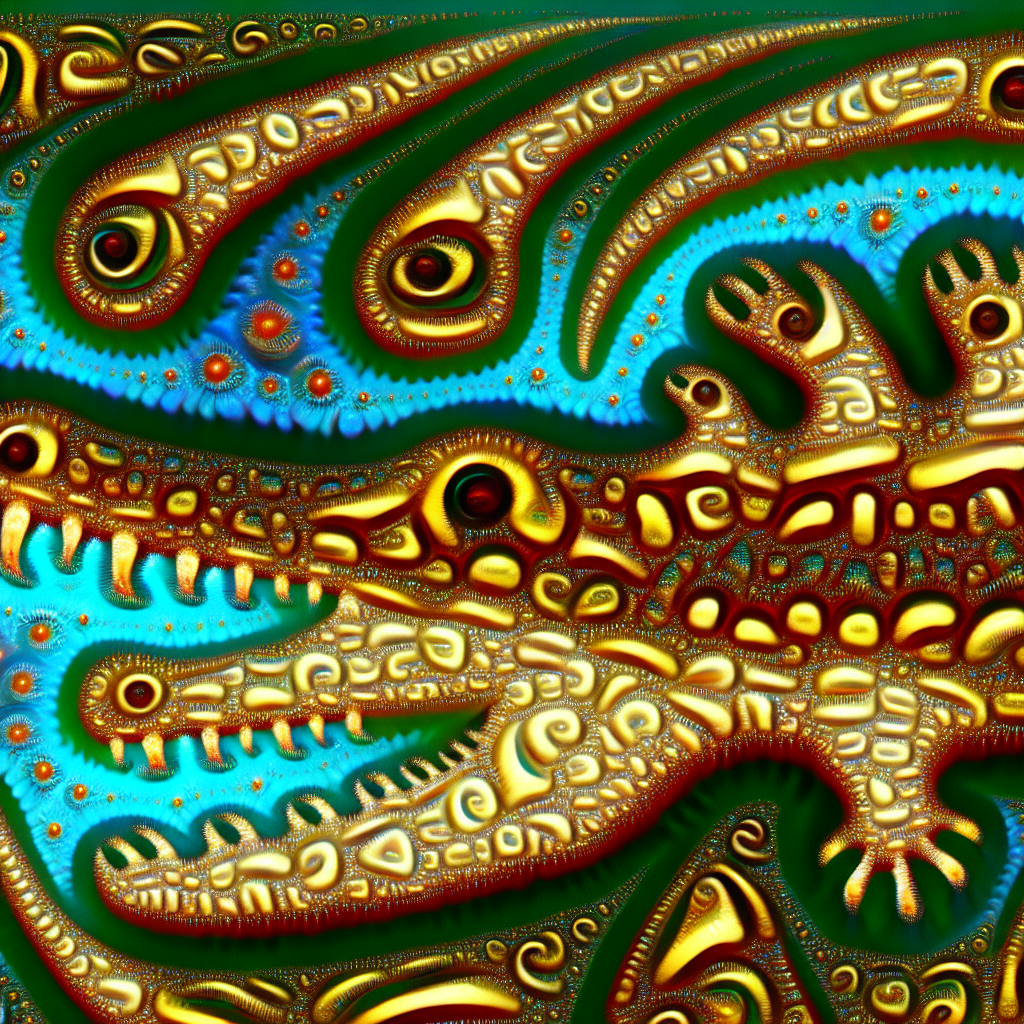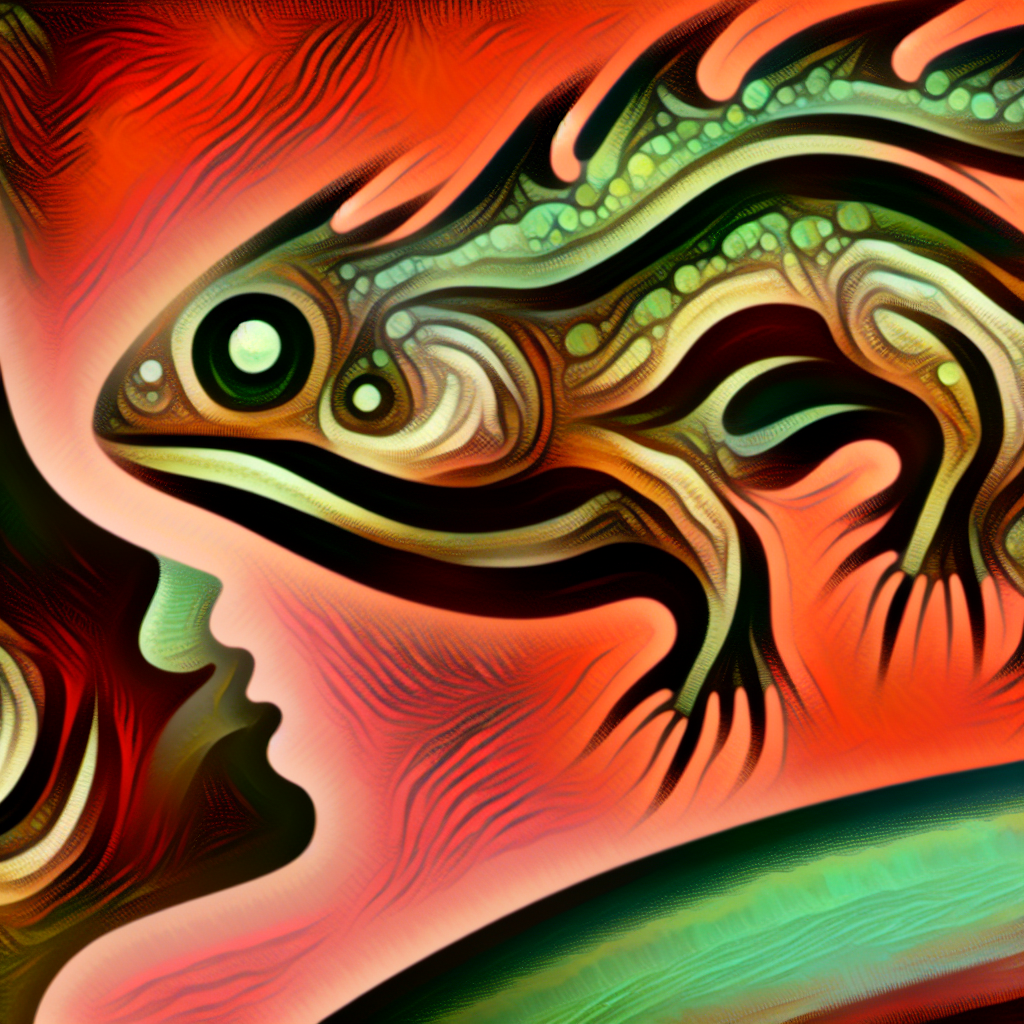
Understanding Dreams: What Does it Mean to Dream of Being Afraid of a Crocodile?
Unlocking the Mystery: What It Means to Dream of Crocodiles
Dreams can be a powerful window into our subconscious mind, often revealing our deepest fears, desires, and concerns. When you dream of being afraid of a crocodile, it can evoke strong emotions and provoke a sense of danger that feels very real. Crocodiles, as symbols, are complex; they can represent lurking dangers, hidden aspects of the self, or even transformative change.
This article explores the multifaceted meanings behind dreaming of crocodiles, grounded in traditional interpretations from Ibn Sirin's 'The Great Book of Dreams,' alongside modern psychological frameworks. By examining cultural beliefs and psychological insights, we will empower you with the tools to reflect on your dreams and gain deeper personal understanding.
Dream Interpretation - Talk to me!

📱 Bestie+ App is Here!
Experience personalized dream interpretations, save your dreams, and share them with your loved ones! Available now on iOS and coming soon on Android.
- Dreams of crocodiles can signify deep-seated fears.
- The symbolism of crocodiles varies across cultures.
- Understanding your emotions in dreams can lead to personal growth.
- Crocodiles in dreams often represent the unconscious mind.

Understanding Common Crocodile Dream Scenarios
- Dream of a crocodile chasing you
This scenario represents feelings of being pursued by your fears in waking life. It may signify avoidance of a problem or person causing distress.
- Dream of swimming with crocodiles
Swimming in proximity to crocodiles can symbolize navigating through emotional complexities. It invites introspection and courage to embrace conflicting feelings.
- Dream of a crocodile attacking someone else
Witnessing a crocodile attack in a dream may reflect feelings of helplessness in your life. It may highlight areas where you feel unable to assist loved ones.
- Dream of a peaceful crocodile
A calm crocodile signifies reconciliation with your fears. This dream may suggest acceptance of past experiences, leading to personal growth.
- Dream of a crocodile in water
Crocodiles in water can symbolize emotional depths. The clarity of the water may indicate that you are ready to confront hidden feelings.
- Dream of being a crocodile
Transforming into a crocodile in a dream indicates empowerment. It signifies embracing your strength and confronting fears head-on.
- Dream of a crocodile in your home
A crocodile in your personal space suggests that there may be fear or conflict within your intimate relationships.
- Dream of a herd of crocodiles
Seeing multiple crocodiles may symbolize overwhelming fears or pressures in your life, indicating that you need to address these collectively.
- Dream of escaping a crocodile
Successfully avoiding a crocodile represents overcoming fears and finding strength in vulnerability. It signifies resilience in the face of adversity.
- Dream of a baby crocodile
Baby crocodiles can symbolize new beginnings or nascent fears. It may highlight aspects of your life where you are just beginning to confront hidden emotions.
Embracing the Wisdom of Crocodile Dreams
Dreams of being afraid of crocodiles are powerful symbols of our subconscious mind's inner workings. They provide insights into our fears, both personal and cultural, while encouraging self-reflection and emotional healing. By interpreting these dreams through various lenses—traditional interpretations, cultural insights, and modern psychological understanding—you can empower yourself to confront fears and engage in personal growth.
Crocodiles, although often perceived as dangerous, can also symbolize transformation and resilience, allowing you to emerge stronger from your challenges. Embrace the wisdom of your dreams, and use them as stepping stones towards a deeper understanding of yourself.
The Psychology Behind Crocodile Dreams: Jung and Freud
From a psychological viewpoint, dreaming about being afraid of a crocodile can be interpreted through both Jungian and Freudian lenses. Jung might argue that the crocodile represents a shadow aspect of your psyche — those traits and fears that you repress in your waking life. This fear can stem from personal insecurities or past traumas that you haven't fully resolved.
Alternatively, Freud's theory would suggest that the crocodile symbolizes a latent fear of aggression or a powerful figure in your life. The emotions tied to these fears often reflect deeper conflicts. Thus, when you dream of crocodiles, it may signify an urgent need to face your fears and integrate those shadow aspects into your identity.
Understanding this psychological interplay allows you to decode your dreams as a means of healing and self-discovery.
Scientific Insights: Neurobiology of Dreams
Recent studies suggest that dreams, particularly those involving fear, are essential for emotional regulation. Research by Dr. Rosalind Cartwright indicates that dreaming allows for emotional processing, enabling individuals to confront and resolve traumatic experiences. Furthermore, neurobiological studies show that fear-based dreams are linked to the amygdala's activation.
As such, dreaming of crocodiles may serve as a method for the brain to work through stressors, integrating experiences and emotions from waking life. Understanding these findings can empower you to realize that your dreams are not random but vital tools for emotional healing.
Crocodiles in Cultural Context: Folklore and Fear
In various cultures, crocodiles are laden with meaning beyond mere fear. Native American tribes often view reptiles as symbols of transformation and renewal. For example, the crocodile may embody the earth's primordial power, symbolizing fertility and resourcefulness.
Conversely, in some African cultures, crocodiles are seen as guardians of the waters, often associated with wisdom and strength. Dreaming of crocodiles can thus illuminate personal and societal conflicts, reflecting cultural narratives surrounding power dynamics and survival. In American culture, the fear of crocodiles may be linked to themes of danger in society, mirroring anxieties around loss of control in everyday life.
Engaging with these cultural nuances can enhance your understanding of what a crocodile represents in your dreams, providing a richer context for self-reflection.
Expert Insights: What Dream Analysts Say
According to dream analyst Dr. Jane Smythe, understanding one's dreams is crucial for emotional well-being. She states, 'Dreams act as a mirror, reflecting our internal struggles and fears. A crocodile signifies an element of danger but also a call to embrace and confront these challenges.' Moreover, cultural psychologist Dr. Albert Yeargin notes how nocturnal anxieties can reflect cultural narratives.
'Fear in dreams often showcases societal dynamics, suggesting that our individual fears are tied to the collective consciousness,' he explains. By integrating these expert insights, one can approach dreams with greater clarity, encouraging a journey of self-discovery and healing.
Positive Interpretations: Growth Through Fear
While dreaming about being afraid of a crocodile may initially seem daunting, it can also symbolize potential for personal growth. Recognizing and confronting your fears can lead to transformation and empowerment. Many cultures view fear as a vital component of success, as it often encourages individuals to take action.
When the crocodile appears in a dream, it can signify that you are ready to confront what has been holding you back. It may represent your capacity to navigate difficult emotions or situations, emerging stronger. Embracing this fear can unlock pathways to healing and personal development.
Ultimately, this symbolism can inspire you to pursue your goals with newfound courage, translating fear into motivation.
The Depth of Crocodile Symbolism in Dreams
In traditional dream interpretation, crocodiles often symbolize hidden fears and the darker aspects of oneself. According to Ibn Sirin, dreaming of a crocodile can indicate a threat that feels omnipresent, akin to the lurking presence of an unfriendly force in your life. In many cultures, crocodiles can also signify transformation due to their reptilian nature, representing the cycle of life and death.
Metaphorically, dreaming of being afraid of a crocodile may reflect feelings of vulnerability and powerlessness in the face of circumstances that feel overwhelming. Just as a crocodile lies in wait, your subconscious may be alerting you to issues hiding beneath the surface — unresolved conflicts, unacknowledged emotions, or fears that need to be addressed. The fear you experience in the dream could also signify your struggle to confront these hidden aspects of yourself, encouraging you to dive into your emotional depths for resolution.
Negative Interpretations: Warning Signs from the Subconscious
Conversely, dreaming of being afraid of a crocodile can serve as a cautionary message. The crocodile symbolizes danger and hidden threats; therefore, this dream might indicate that there are unresolved fears or looming issues in your life requiring immediate attention. It may serve as a reflection of anxiety related to a person or situation in your waking life that feels threatening.
Such dreams encourage you to acknowledge these emotions and assess the aspects of your life where you may feel vulnerable. This interpretation urges listeners to confront their fears rather than ignore them, as suppression can lead to more severe repercussions down the line.
Practical Tips for Engaging with Your Crocodile Dreams
- Keep a Dream Journal
Documenting your dreams can help you track recurring themes and symbols. By noting details upon waking, you can create a clearer picture of the dream's significance. Regularly reviewing these entries may reveal patterns that illuminate your emotions and instincts, helping you address hidden fears.
- Reflect on Your Emotions
Take time to meditate on the feelings associated with your crocodile dream. Understanding the emotions present can guide you in reflecting on situations in your waking life that may evoke similar sentiments. Take note of these feelings as they may provide clues to what needs your attention or resolution.
- Seek Professional Guidance
If dreaming about crocodiles continues to evoke anxiety, consider speaking with a therapist or dream analyst. Professional guidance can help you unpack recurring fears and facilitate personal growth, allowing you to explore the deeper meanings of your dreams in a supportive environment.
- Engage in Creative Expression
Use artistic endeavors such as painting, writing, or acting to express the themes from your dream. Engaging creatively can facilitate a deeper understanding of your fears and emotions, transforming anxiety into insight through self-expression.
- Practice Mindfulness
Incorporating mindfulness practices can help ground you when dealing with fears that emerge from your dreams. Techniques such as meditation or deep breathing can support emotional regulation, enhancing your ability to face fears arising from your subconscious.

FAQs
- What does it mean to dream about crocodiles frequently?
Frequent dreams about crocodiles can indicate ongoing unresolved fears or anxieties in waking life. The dream serves as a reminder to address these fears, inviting you to explore the root causes of this emotional disturbance.
- Are crocodiles in dreams always negative symbols?
Not necessarily. While crocodiles can represent fears and threats, they can also embody transformation, strength, and resilience. The context of the dream and your emotions during it will clarify the meaning.
- How can I interpret my crocodile dreams better?
Reflecting on your emotions during the dream, noting recurring themes, and exploring cultural and psychological meanings can enhance your interpretation. Keeping a dream journal can also help you draw connections over time.
- Are dreams of crocodiles common?
Crocodiles, being potent symbols of fear and transformation, are prevalent in dreams, especially in cultures where they are seen as powerful creatures. Their appearance often relates to personal anxiety or emotional struggles.
- Should I be worried if I dream of crocodiles?
Worry is not the intended outcome. Instead, view these dreams as opportunities for introspection. They often signal the need to address fears rather than serving as ominous warnings.


